|
|
|
Sort Order |
|
|
|
Items / Page
|
|
|
|
|
|
|
| Srl | Item |
| 1 |
ID:
069186
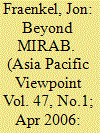

|
|
|
| 2 |
ID:
116427


|
|
|
|
|
| Publication |
2012.
|
| Summary/Abstract |
Abstract The Republic of Fiji experienced three armed coups in less than twenty years - 1987, 2000, and again in 2006 - symptoms of inter-communal tensions in the country and a political, economic and social system unable to manage them. The Commonwealth, through the good offices of its Secretary-General, was the lead international actor in responding to the crisis that followed the 2000 coup. The following study provides an overview of the Commonwealth as an institution, with a focus on its conflict prevention capacity, through the lens of its actions in Fiji at the time. It seeks to identify the nature and impact of Commonwealth engagement, highlighting potentially useful lessons regarding the institution, the individuals who acted on its behalf, and the efficacy of their actions.
|
|
|
|
|
|
|
|
|
|
|
|
|
|
|
|
| 3 |
ID:
193632
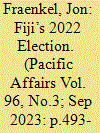

|
|
|
|
|
| Summary/Abstract |
An election held under semi-authoritarian conditions in Fiji in December 2022 saw a narrow defeat for coup leader Frank Bainimarama’s incumbent FijiFirst Party. This paper looks at the political parties, the campaign issues, and the results. It argues that fear of yet another coup, as occurred in 1987, 2000, and 2006, was a critical factor determining election outcomes in 2014 and 2018, but a credible rejection of that option by the Republic of Fiji Military Forces in 2022 and an opposition campaign that could no longer be depicted as ethno-nationalist paved the way for regime change in Fiji.
|
|
|
|
|
|
|
|
|
|
|
|
|
|
|
|
| 4 |
ID:
121667
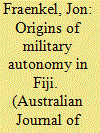

|
|
|
|
|
| Publication |
2013.
|
| Summary/Abstract |
Alongside Thailand and Pakistan, Fiji has gained a reputation as the most coup-prone state in the Asia-Pacific region. Following a succession of coups, Fiji's military eventually established a longer-term authoritarian administration, inviting comparisons with Burma and Indonesia under Suharto, where military rulers also saw themselves as playing an overarching guardian role transcending ethnic cleavages. Yet, unlike Burma and Indonesia, Fiji's military has no heroic history of involvement in a national liberation struggle and faces no serious threat to territorial integrity. This article examines the dynamics of Fiji's three coups and the accompanying shifts in military orientation. During the initial coups, the military served principally as an instrument of the country's ethnic Fijian chiefly elite. Since the third coup, in December 2006, it has not only confronted key institutions of Fijian power, including the Great Council of Chiefs and the Methodist Church, but also dismantled core bases of Fiji Indian politics, including sugar cane farmers' organisations and municipal councils. International focus on the electoral timetable has distracted attention from these deeper-seated changes. Fiji has reached the end of a long era of bicommunal ethnic politics, with schisms amongst indigenous Fijian factions likely to dominate the country's politics in the future.
|
|
|
|
|
|
|
|
|
|
|
|
|
|
|
|
| 5 |
ID:
165391
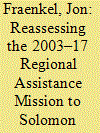

|
|
|
|
|
| Summary/Abstract |
The 2003–17 Australian and New Zealand-led Regional Assistance Mission to Solomon Islands (RAMSI) is widely considered to be a comparatively successful peacebuilding mission. Jon Fraenkel argues that a fuller assessment of RAMSI needs to consider the low intensity of the preceding conflict, and the way that conflict changed over 2001–03 in ways that encouraged a law and order focus. Within Oceania, RAMSI is usually seen as fairly successful in achieving its short-term security objectives, but less effective in reaching its more ambitious state-building goals, though without much attention to the reasons for that contrast. There has been little appreciation of the longer-run ramifications of the 2006–07 crisis in relations between Australian authorities and the Solomon Islands government.
|
|
|
|
|
|
|
|
|
|
|
|
|
|
|
|
| 6 |
ID:
187469
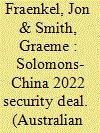

|
|
|
|
|
| Summary/Abstract |
A security deal struck between the Solomon Islands and China in April 2022 has been depicted as the precursor to the establishment of a Chinese naval base in the Pacific. Fed by the proximity of an Australian federal election, these fears have stimulated lurid images in the Australian press of Beijing's aircraft carriers being stationed off Brisbane's coast creating a Pacific version of the 1962 Cuban missile crisis. In this paper, we examine the provisions of the ‘framework agreement’, explore its rationale and consider the likelihood that the predicted naval base eventuates. We also investigate Chinese extraterritoriality on the global stage and Chinese commercial activity in the Solomons since the switch in diplomatic recognition from Taipei to Beijing in 2019. We argue that Solomon Islands Prime Minister Manasseh Sogavare signed the deal primarily in response to domestic pressures, in particular the danger of a repeat of major riots that took place in the capital in November 2021. The most pressing risk is not Chinese warships or nuclear missiles stationed in Honiara, but repression to handle urban unrest without the restraint required of Australian, Papua New Guinean, Fijian or New Zealand police officers.
|
|
|
|
|
|
|
|
|
|
|
|
|
|
|
|
|
|
|
|
|